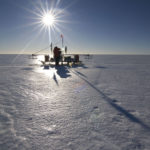EU-PolarNet
EU-PolarNet: Connecting Science with Society
- Start date
- 1 March, 2015
- End date
- 28 February, 2020
Polar issues have been rising up the political agenda across Europe over the past decade. The rising level of investment now being made by governments is a clear demonstration of how critical polar research outcomes are for informing policy objectives, including those related to climate change, energy security, global food security, innovation and economic growth.

From 2015-2020 EU-PolarNet will develop and deliver a strategic framework and mechanisms to prioritise science, optimise the use of polar infrastructure and broker new partnerships that will lead to the co-design of polar research projects that deliver tangible benefits for society. By adopting a higher degree of co-ordination of polar research and operations than has existed previously the consortium engages in closer co-operation with all relevant actors on an international level.
Addressing the most pressing issues in the Polar Regions
A key objective for EU-PolarNet is to develop a number of white papers focussed on topics of high interest to European society. These papers concentrate on the outcomes of future research that will bring economic, social or cultural benefits. International EU-PolarNet experts from 16 countries met during September 2017 for two-day workshop to debate, identify and draft white papers within five key areas: People; Climate and Cryosphere; Sustainable Management of Resources and Human Impacts; Polar Biology, Ecology and Biodiversity; and New Technology.
This workshop is an important milestone towards an integrated European Polar Research Programme – one of EU-PolarNet’s main deliverables.
Watch Professor David Vaughan, BAS Director of Science, talk about the workshop.
Interview with Aqqaluk Lynge is a Greenlandic author, the former president of the Inuit Circumpolar Council and a former member of the United Nations Permanent Forum on Indigenous Issues.
EU-PolarNet aims to improve co-ordination between EU member polar research institutions building on existing networks to create a resource orientated infrastructure access and usage plan. This plan would allow for the co-ordination of data and infrastructure between all the partner organisations.
EU-PolarNet will develop an integrated EU Polar research programme by identifying short and long-term scientific needs and optimising the use of co-ordinated Polar infrastructure for multi-platform science missions whilst fostering trans-disciplinary collaboration on Polar research.
EU-PolarNet will also create and sustain ongoing dialogue and co-operation with Polar stakeholders by supporting meaningful interaction to shape future research, exchange key information and foster joint involvement.
Beatrix Schlarb-Ridley
Director of Innovations and Impact
BAS Science Strategy Executive Group, Information Services team, Innovation team, BAS Management team, UK Polar Data Centre team, BAS Executive team
BAS scientists at 2017 COP23 climate event in Bonn
8 November, 2017
This week (10-11 November) leading scientists and experts from EU-funded research programmes engage with political leaders from the Pacific Ocean and the Arctic to examine the economic and social consequences …
NEWS STORY: Consultation – polar research priorities for Europe
17 February, 2016
Take part in an online consultation about Europe’s research priorities for the Polar Regions
PRESS RELEASE: New network for polar science
19 May, 2015
EU boost for polar science A new initiative to enhance the integration of Europe’s scientific and operational capabilities in the Polar Regions has been funded by the EU Horizon 2020 …


